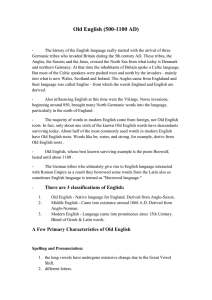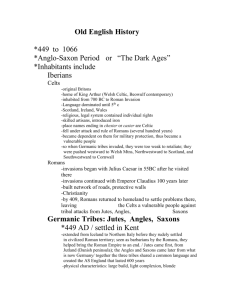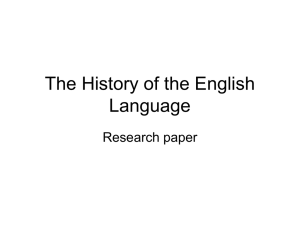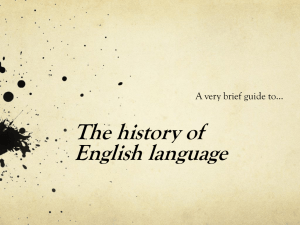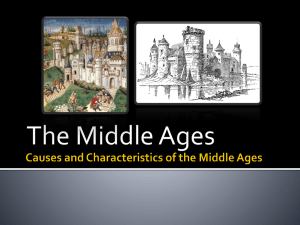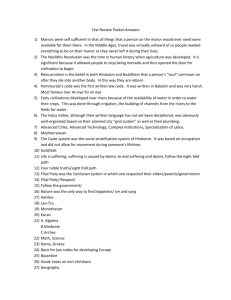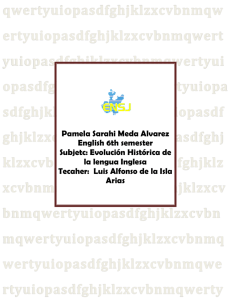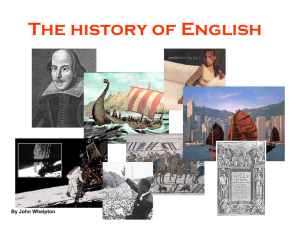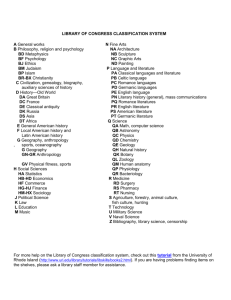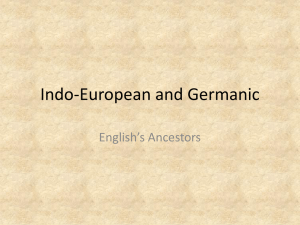small group readings - Lyndhurst School District
advertisement
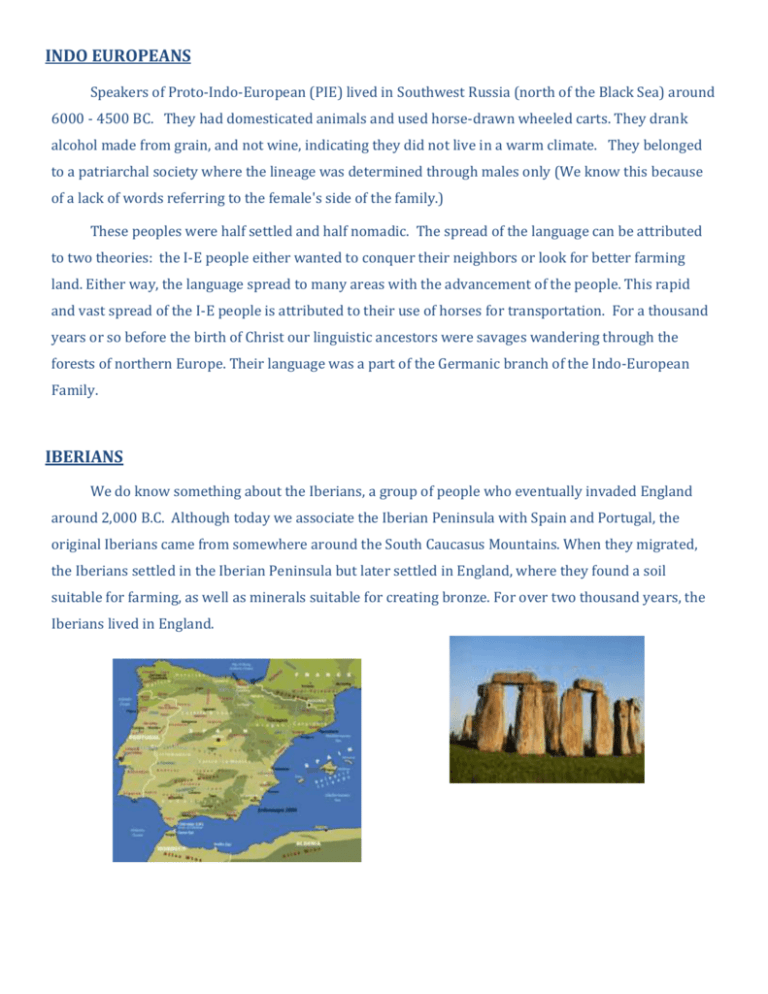
INDO EUROPEANS Speakers of Proto-Indo-European (PIE) lived in Southwest Russia (north of the Black Sea) around 6000 - 4500 BC. They had domesticated animals and used horse-drawn wheeled carts. They drank alcohol made from grain, and not wine, indicating they did not live in a warm climate. They belonged to a patriarchal society where the lineage was determined through males only (We know this because of a lack of words referring to the female's side of the family.) These peoples were half settled and half nomadic. The spread of the language can be attributed to two theories: the I-E people either wanted to conquer their neighbors or look for better farming land. Either way, the language spread to many areas with the advancement of the people. This rapid and vast spread of the I-E people is attributed to their use of horses for transportation. For a thousand years or so before the birth of Christ our linguistic ancestors were savages wandering through the forests of northern Europe. Their language was a part of the Germanic branch of the Indo-European Family. IBERIANS We do know something about the Iberians, a group of people who eventually invaded England around 2,000 B.C. Although today we associate the Iberian Peninsula with Spain and Portugal, the original Iberians came from somewhere around the South Caucasus Mountains. When they migrated, the Iberians settled in the Iberian Peninsula but later settled in England, where they found a soil suitable for farming, as well as minerals suitable for creating bronze. For over two thousand years, the Iberians lived in England. ANGLO-SAXONS The history of the English language really started with the arrival of four Germanic tribes who invaded Britain during the 5th century AD. These tribes, the Angles, the Saxons, the Jutes, and the Frisians crossed the North Sea from what today is Denmark and northern Germany. At that time the inhabitants of Britain spoke a Celtic language. But most of the Celtic speakers were pushed west and north by these AngloSaxon invaders - mainly into what is now Wales, Scotland and Ireland. The Angles came from Englaland (Angle Land = Land of the Angles) and their language was called Englisc - from which the words England and English are derived. Their name lives on in the district of England named East Anglia, and also in the Anglican Church. In the present day there is still a region of Germany known as Angeln, which is likely the same area from which the original Angles came. Germanic invaders entered Britain on the east and south coasts around 410 AD. There is documentation to support the fact that the Germanic tribes were a sophisticated society. They had destroyed the Roman civilization in England and built their own. They aligned with the Celtic clergy and converted to Christianity. Laws and contracts were written down for a sense of permanence and control. The Germanic tribes were exposed to Latin before they invaded England, so the languages they spoke did have some Latin influence. After converting to Christianity, Latin had more influence, as evidenced in words pertaining to the church. Celtic did not have a large impact on English, as only a few place names are of Celtic origin, but Danish (Old Scandinavian) did contribute many vocabulary words. Old English (450-1100 AD) Part of Beowulf, a poem written in Old English. The invading Germanic tribes spoke similar languages, which in Britain developed into what we now call Old English. Old English began around 449 AD. Old English did not sound or look like English today. Native English speakers now would have great difficulty understanding Old English. Nevertheless, about half of the most commonly used words in Modern English have Old English roots. The words be, strong and water, for example, derive from Old English. Old English was spoken until around 1100. The Normans and Middle English (1100-1500) The period of Middle English begins with the Norman invasion of 1066. King Edward the Confessor (of England) died without heirs, and William, Duke of Normandy (France), believed that he would become the next king. However, upon learning that Harold was crowned king, William invaded England, killed Harold and crowned himself king during the famous Battle of Hastings. William spoke only French. The new conquerors (called the Normans) brought their French language with them, which became the language of the Royal Court, and the ruling and business classes. As a result, there was a linguistic class division - the upper class in England began to speak French while the lower An example of Middle English by Chaucer. classes spoke English. The Normans or “north men” were tribes descended from Vikings. In the 14th century English began to be merged with many French words. This language is called Middle English. It was the language of the great poet Chaucer (1340-1400). But by 1250, French began to lose its prestige. King John had lost Normandy to the French in 1204, and after him, King Edward I spoke only English. At this time, many foreigners entered England, which made the nobility feel more "English" and so encouraged more use of the English language. The upper class tried to learn English, but they still used French words sometimes, which was considered somewhat snobbish. French still maintained its prestige elsewhere, and the upper class did not want to lose it completely. Nevertheless, the Hundred Year's War (13371453) intensified hatred of all things French. Because the English underclass cooked for the Norman upper class, the words for most domestic animals are English (ox, cow, calf, sheep, swine, deer) while the words for the meats derived from them are French (beef, veal, mutton, pork, bacon, venison). Early Modern English (1500-1800) Towards the end of Middle English, a sudden and distinct change in pronunciation (the Great Vowel Shift) started, with vowels being pronounced shorter and shorter. From the 16th century the British had contact with many peoples from around the world. This, and the Renaissance, meant that many new words and phrases entered the language. The invention of printing also meant that there was now a common language in print. Books became cheaper and more people learned to read. Printing also brought standardization to English. Spelling and grammar became fixed, and the dialect of London, where most publishing houses were, became the standard. In 1604 the first English Hamlet's famous "To be, or not to be" lines, dictionary was published. written in Early Modern English by Shakespeare. Beginning in 1500 A. D., English moved into its third stage, called Modern English. Born in 1564, Shakespeare had the most profound effect on English; he possessed an enormous vocabulary, experimented with language, and wrote sonnets, poems, and plays. Most modern readers have little trouble reading poetry or prose from this period, just as most modern readers and speakers are grateful that during this time, the language became simpler than its Old English and Middle English forms. Because of the influence of Shakespeare and the economic and military power that England achieved under Queen Elizabeth I, the English language increased in its international importance. Late Modern English (1800-Present) The main difference between Early Modern English and Late Modern English is vocabulary. Late Modern English has many more words, arising from two principal factors: firstly, the Industrial Revolution and technology created a need for new words; secondly, the British Empire at its height covered one quarter of the earth's surface, and the English language adopted foreign words from many countries. Since 1900, a very large amount of vocabulary words has been added to English in a relatively short period. The majority of these words are related to science and technology, and use Greek and Latin roots. Dialects in the United States resulted from different waves of immigration of English speakers, contact with other languages, and the slave trade, which had a profound impact on AfricanAmerican English. The English language is spoken by 750 million people in the world as either the official language of a nation, a second language, or in a mixture with other languages (such as pidgins and creoles.) English is the (or an) official language in England, Canada, Australia and New Zealand; however, the United States has no official language. CELTS Over the centuries the British Isles were invaded and conquered by various peoples, who brought their languages and customs with them as they settled in their new lives. The Celts originally invaded in about 700 BC. The Celts originated in what is currently southeastern Germany, Western Austria, and the current Czech Republic. A warlike people, they fought against the Iberians and drove some of them out of England, into what is currently Ireland, Scotland, and Wales. Eventually, however, the Celts intermarried with the remaining Iberians and settled down. There is now very little Celtic influence left in the English language. The earliest time when we can say that English was spoken was in the 5th century CE (Common Era—a politically correct term used to replace AD). After the Anglo-Saxon invasions of 450 A.D., the Celtic language was relegated to the mists of its Irish island where it is now called Gaelic and is still spoken there today. The influence of Celtic upon Old English was slight. In fact, very few Celtic words have lived on in the English language except place and river names such as: Kent, York, Dover, Cumberland, Thames, Avon, Trent, Severn. ROMANS Many of the words passed on from this era are those coined by Roman merchants and soldiers. In 55 B. C., Julius Caesar and the Romans attempted to invade England but were unsuccessful. The Romans would not return to England for a more permanent settlement for approximately ninety years, when Claudius invaded in 43 A. D. From that point, the Romans stayed in England for over three hundred fifty years. They brought with them a vulgate form of Latin, the Latin of the streets rather than the Latin of literary texts. Latin would later have a profound influence on the English language. The Roman legions pulled out of England, sometime around 407 A. D., when Germanic invading tribes took over England wiped out a great deal of the Roman influence in the country. The Vikings and the Scandinavian Settlements The next invaders were Vikings. Vikings were made up of the Danes of Denmark and the Norse of Norway (Norsemen). Between 750 AD and 1050 AD large numbers of Norse invaders settled in Britain, particularly in northern and eastern areas, and in the eleventh century the whole of England had a Danish king, Canute. The distinct North Germanic speech of the Norsemen had great influence on English, most obviously seen in the words that English has borrowed from this source. The common Germanic base of the two languages meant that there were still many similarities between Old English and the language of the invaders. The Vikings, being Scandinavian, spoke a language (Old Norse), which, in origin at least, was just as Germanic as Old English. Vikings began raiding and plundering the coasts of England, Ireland, and Western Europe when the population in Scandinavia had grown so much that the area's resources could no longer support it. They attacked unprotected cities and towns, taking what they could carry and destroying what was left. The Vikings were Germanic pagans. They celebrated the Old Norse legends. The fact that the Vikings were not Christians and did not respect priests and churches was one of the characteristics that made them especially feared by Christian Europeans.

